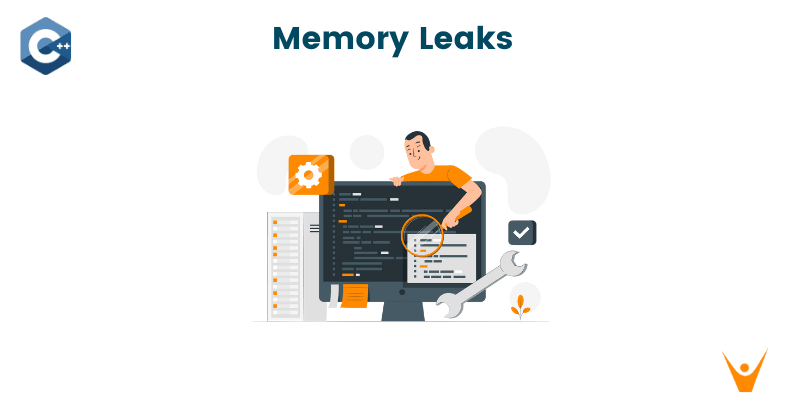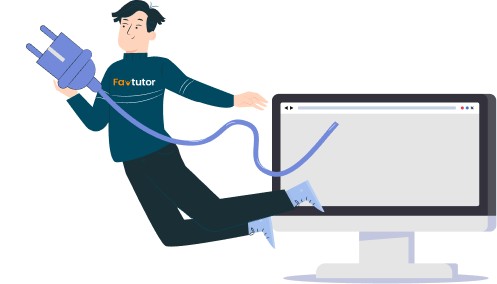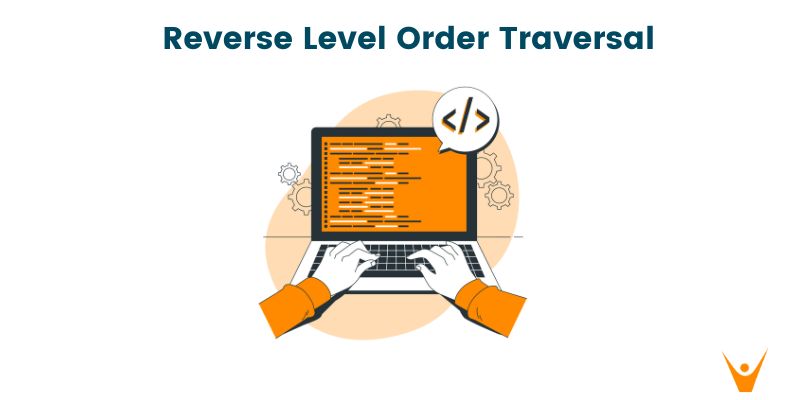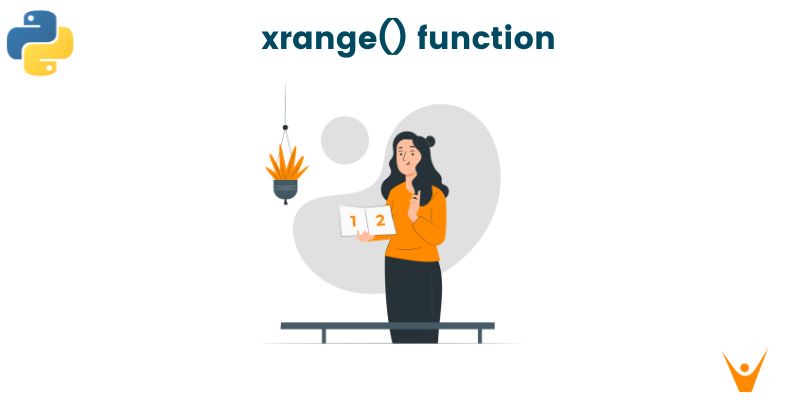Unlike any other bugs, memory leaks are subtle and hard to detect in C++. Generally, memory leaks occur if a coder allocates memory dynamically and does not use the delete() function to delete it after use. In this article, we will explain what are memory leaks in C++, which tools are used to find these leaks, and how to avoid them.
What is a Memory Leak in C++?
A memory leak occurs when a programmer does not allocate a previously allocated memory, resulting in deallocation, which thus causes a memory leak. This is because the program does not require this memory but it is still present in the program.
Memory leaks can result in a waste of memory, slowing down the performance of the running codes, or crashing the program. So, it is the responsibility of the C++ programmer to remove the dynamically allocated memory when it is no longer required.
Let's understand better with the following example:
int main() { int* ptr = new int[10]; ptr[0] = 1; ptr[1] = 2; // forgot to delete ptr, causing a memory leak return 0; }
In this case, the program uses the new operators to dynamically allocate an array of 10 numbers, giving the element's first two values. The memory allotted by the new operator is not deleted by the application, which results in a memory leak. One can prevent memory leak in this code, by using a return statement that allocates and deallocates the selected memory.
delete[] ptr;
Are C++ memory leaks permanent?
No, Memory leaks that happen in C++ are not permanent because the memory will ultimately be reclaimed by the OS after the program ends. But these leaks can persist by degrading the performance of the program every time.
But be careful because it can crash the program or result in running out of memory, which is not good for big applications than handles large amounts of data.
What causes memory leakage?
Now that we understood what causes memory leaks, let's find out what are the common reasons behind this accident.
The main cause of memory leaks is the negligence of the programmer. Generally, programmers tend to forget to deallocate memory using the delete function and use the new operator and there occurs a wastage of memory, which in turn causes memory leakage in the programming code.
Sometimes, memory can also be leaked if a program throws an exception as that memory might have not been dynamically deallocated. There are also times when a program can result in losing track of dynamically created memory and failing to deallocate it correctly, which can lead to a memory leak.
One more common cause is the bad design of a program. Programs like building objects which cannot be destroyed or deleted, and holding onto objects longer than is required, also cause wastage of memory spaces.
How to detect them?
Standard C/C++ operations like malloc, operator new, calloc, and operator new[ make up the majority of memory allocations; operating system API handles the remainder. It is feasible to instruct Visual C++ to record the call stack for each such allocation. Nevertheless, it only functions in debug builds.
What tool is used to find Memory Leaks in C++?
There are several tools that can be used to find memory leaks in C++, as listed below:
- Valgrind: It is a popularly used tool for detecting errors and leakages of memory as well as helps in figuring out run time errors in programs. Moreover, this provides a tool for memory checks which easily detects any errors in the complete program, irrespective of the length of the code.
- Address Sanitizer: Another famous memory detection tool that is built into the GCC compilers. This can also detect memory leaks, butter overflows, and so much more.
- Purify: This memory detector is widely used in commercial industries. It works by initializing the executable code of the program to monitor the allocation and deallocation of memory.
- Visual Leak Detector: This is an open-source tool for detecting memory errors and leakages in Windows. It operates by listening for calls to the new and delete operators and keeping track of the allocation and deallocation of the memory.
How to Avoid Memory Leaks in C++?
The best way to prevent memory leaks in C++ is to make use of RAII. RAII stands for Resource Acquisition Is Initialization. It reduces the number of new() and delete() functions feasibly.
Everything that requires dynamic memory should be buried within the RAII object which releases the memory only after it exits the scope. AII allocates memory in the function Object() { [native code] } and releases it in the destructor, ensuring that memory is deallocated when the variable exits the current scope.
You can also employ smart pointers of C++11 to avoid memory leaks. These pointers were developed as entities that function like reference points but handle memory allocation and deallocation automatically. While managing one's dynamic memory allocation, use them whenever possible.
Standard containers like vectors, lists, maps, etc automatically handle the allocation and deallocation of memory. So, using them is an advantage as they can easily prevent memory leaks.
Also, try not to use shared_ptr, which causes circular references. When a circular reference occurs, it is difficult to deallocate a memory as the shared_ptr holds two objects together, preventing their deallocation.
Overall, it is the individuals' responsibility to allocate memory using the new() function, they should make sure to deallocate it with delete when they're done with it. Otherwise, it will cause memory leakage if it will not be deleted at a particular time. Moreover, use comments to specify which pointer belongs to which objects and when they should be destroyed.
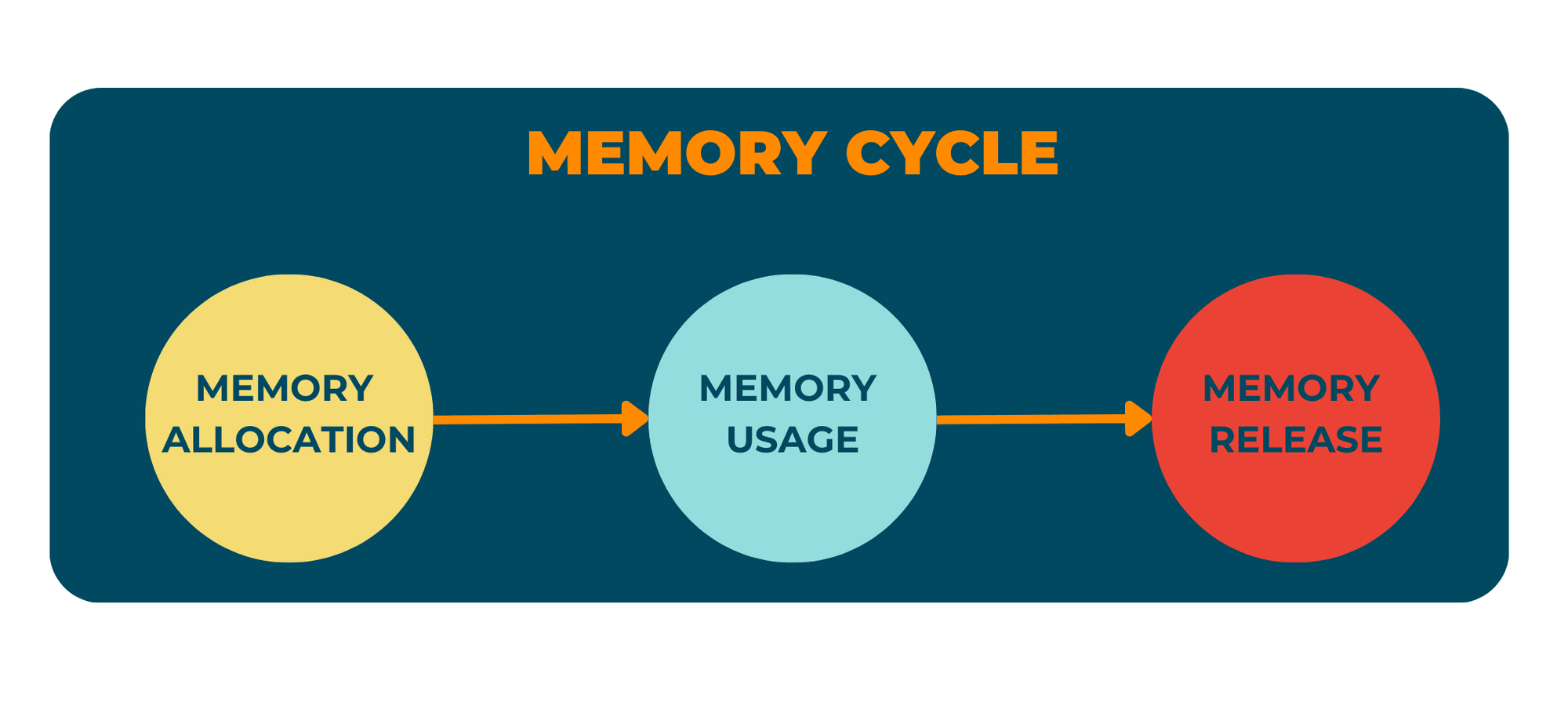
Here is an example to use RAII:
#include #include class MyClass { public: MyClass() { std::cout << "MyClass constructor" << std::endl; } ~MyClass() { std::cout << "MyClass destructor" << std::endl; } }; int main() { std::unique_ptr<MyClass> ptr(new MyClass()); // Allocate memory using unique_ptr // Do some work with the object std::cout << "Doing some work with MyClass object" << std::endl; // Automatically deallocate memory when unique_ptr goes out of scope return 0; }
In this example, with the help of RAII, the unique_ptr handles the allocation and deallocation of memory. When the unique_ptr is no longer in scope, the object destructor of MyClass is automatically called, which helps in deallocating the memory and thus prevents any memory leakage in the program.
Takeaways
It is absolutely essential to be conscious of the root causes of memory leaks and to take preventative measures, such as using smart pointers and adhering to best practices for memory management. We covered all about Memory Leaks in C++ and how to avoid leakage with examples.


